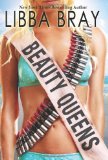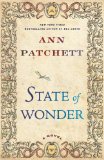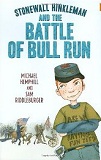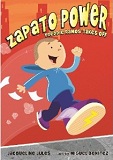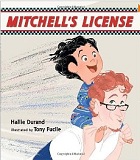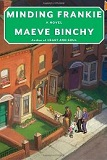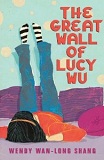Review of Beauty Queens, by Libba Bray
by Libba Bray
Scholastic Press, New York, 2011. 396 pages.
Starred Review
Okay, this book is hilarious, laugh-out-loud funny. It is irreverent, has frank sexuality of different types, and makes fun of people who give easy answers — including a Christian leading a song “Jesus is my Co-pilot” while their plane crashes. However, most of the things the author makes fun of fully deserve to be made fun of. The book mostly mocks our corporate culture and the messages we send to women about their bodies and their sexuality. And the book is definitely funny. Did I mention that it made me laugh out loud?
I love Libba Bray from the moment I heard her speech at the 2010 Printz Awards. Funny irreverence is where she shines, and in this book, she harnesses it all into a rollicking tale of survival.
The story is about a group of survivors of a plane crash on a desert island. The plane was filled with Miss Teen Dream contestants, and all the adults (and most of the contestants) die in the crash. But don’t worry! I’ll give you the first page or so, so you’ll know it’s a Happy Story:
“A WORD FROM YOUR SPONSOR
“This book begins with a plane crash. We do not want you to worry about this. According to the U.S. Department of Unnecessary Statistics, your chances of dying in a plane crash are one in half a million. Whereas your chances of losing your bathing suit bottoms to a strong tide are two to one. So, all in all, it’s safer to fly than to go to the beach. As we said, this book begins with a plane crash. But there are survivors. You see? Already it’s a happy tale. They are all beauty queen contestants. You do not need to know their names here. But you will get to know them. They are all such nice girls. Yes, they are nice, happy, shining, patriotic girls who happen to have interests in baton twirling, sign language, AIDS prevention in the animal population, the ancient preparation of popadam, feminine firearms, interpretive dance, and sequins. Such a happy story. And shiny, too.
“This story is brought to you by The Corporation: Because Your Life Can Always Be Better (TM). We at The Corporation would like you to enjoy this story, but please be vigilant while reading. If you should happen to notice anything suspicious in the coming pages, do alert the proper authorities. Remember, it could be anything at all — a subversive phrase, an improper thought or feeling let out of its genie bottle of repression, an idea that challenges the status quo, the suggestion that life may not be what it appears to be and that all you’ve taken for granted (malls, shopping, the relentless pursuit of an elusive happiness, prescription drug ads, those annoying perfume samples in magazines that make your eyes water, the way anchormen and women shift easily from the jovial laughter of a story about a dog that hula-hoops to a grave report on a bus crash that has left five teenagers dead) may be no more consequential than the tattered hem of a dream, leaving you with a bottomless, free-fall feeling.
“This is the sort of thing we are warning you about.
“But let’s not worry, shall we? There’s nothing to worry about. Though there is the threat of war, it happens in the background, in snippets on the nightly news between ads for sinus medicines. It’s none of our concern. This is a happy story.
“Now, our story begins, as many happy stories do, with a blue, blue sky. A blue, blue sky punctuated by thick white clouds; they drift across the expanse like semicolons, reminding us that there is more to come. The pilot, a man in his forties who once stayed on a mechanical bull for a full eight seconds, has just turned off the FASTEN SEAT BELTS sign. The flight is on its way to a remote tropical paradise where the girls will compete against one another for the title of Miss Teen Dream.
“Oh dear. Compete is a rather ugly word, isn’t it? After all, these are such lovely girls, pure of heart and high of spirits. Let’s say that they will be ‘drawing on their personal best,’ and some girls will ‘proceed on a path of Miss Teen Dreamdom’ while others will ‘have the option to explore other pageant opportunities elsewhere at an unspecified future time.’ Ah. There. That’s much better, isn’t it?”
That should give you the idea. If the above strikes you funny, you will enjoy this book, because that is just the beginning.
When twelve girls find themselves on a beach after the plane crash, Taylor Rene Krystal Hawkins, Miss Teen Dream Texas, organizes them into two teams, The Sparkle Ponies and The Lost Girls, to find out what they have and deal with the situation. They’re determined to stay Pageant-ready until they are rescued. But rescue is not quick in coming.
Here’s the scene when the Lost Girls come back and report that there are no survivors at the plane crash site:
“Taylor’s sharp clap echoed on the beach, ‘Teen Dreamers! We need to focus like it’s the final interview round and the questions are all about anorexia and current events. Now, I know y’all are upset. This is just plain awful. But God doesn’t make mistakes. Is this a setback, Teen Dreamers?’
“‘Totally,’ wailed Miss Arkansas. Her left arm was broken. It had been bandaged into a ninety-degree angle as if she were perpetually waving to an unseen crowd.
“‘No, ma’am. No, it is not. I know what Ladybird Hope would say. She would say that this is an opportunity for growth and the establishment of your personal brand. Everybody loves a survivor. And everybody loves a Miss Teen Dream contestant. When you put those two together, you have a lot of hope. And big endorsement opportunities when we get back. Let’s get a woo-hoo goin’!’
“A halfhearted chorus of ‘woo-hoo’ rippled through the horseshoe-shaped cluster of exhausted, hungry girls.
“Taylor shouted, ‘Now, I know y’all can be louder than that!’
“‘WOO-HOO!’
“‘That’s the Miss Teen Dream spirit. Sparkle Ponies, report: What did y’all salvage from the plane?’
“The girls listed off their bounty: four hot roller sets, two straightening irons, a few teeth-bleaching trays, five seat cushions, three waterlogged beauty magazines, a notebook, laxatives, diet pills, a few suitcases filled with clothes, evening gowns, a collection of mismatched bathing suit tops and bottoms, various shoes, bags of pretzels, and bottles of water.”
It’s actually surprising how well the girls do under these difficult conditions. To add to the fun, the author throws in that they have crashed on an island where a government conspiracy is taking place. What’s more, after some weeks, the cast of the reality show, Captains Bodacious IV: Badder and More Bodaciouser and their shipload of pirates, gets shipwrecked on the very same island.
That should give you the idea. It’s not intended to be realistic. (Or is it?) The story is punctuated with pageant data sheets about the contestants and “Commercial Breaks” in favor of products made by The Corporation. I loved lines like this: “Lady ‘Stache Off. Because there’s nothing wrong with you. . . that can’t be fixed.”
This book is good, silly fun with barbs pointed at our corporate culture. Definitely an entertaining read.
Find this review on Sonderbooks at: www.sonderbooks.com/Teens/beauty_queens.html
Disclosure: I am an Amazon Affiliate, and will earn a small percentage if you order a book on Amazon after clicking through from my site.
Source: This review is based on a library book from the Fairfax County Public Library.
